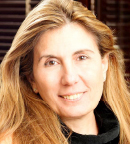
Evangelia Razis, MD, PhD
All homes and all families have or have had their own cancer experiences. Speaking about it dissolves the taboo and allows for earlier diagnosis, less discrimination, increased awareness, and higher commitment by authorities. It also helps those struggling with the disease feel like part of a bigger community, and that their cancer therapy is part of a global effort.
We as providers should come out with our own or our family’s stories and help make the causes more real.
The fear—and even the guilt—that is part of a cancer diagnosis is one of its most devastating characteristics—as if you are suddenly uprooted and moved to another category of fellow humans, somewhere with those who have found out what it is like to have to face our own mortality. In some societies, one is literally ostracized.
Years ago, at a European Society for Medical Oncology conference, a patient with ovarian cancer spoke at the opening ceremony and said, “Sitting around a dinner table, people will lower the voice when they mention that so-and-so had cancer, but not when they say that so-and-so had a heart attack.” Why is that? Is there shame involved? Why do we hide the diagnosis even from the patient themselves, when we don’t do so for most other serious illnesses?
Come out loud and clear so that the words themselves stop being so scary, so people are not afraid to seek care for their symptoms!
For those fortunate enough to be battling cancer in countries where some research effort is taking place, consider taking part in research projects. That is what got us to where we are in oncology, and more efforts will take us further.
Finally, a thought for all those who have devoted their lives in the fight against cancer—doctors, nurses, researchers, administrative staff, social workers, patient advocates. They, too, must battle with the odds, facing burnout every day. Awareness and compassion help their work, too.
I will speak out about my cancer story and participate in research. I will support all those working to fight cancer. I can and I will. ■
Dr. Razis is a member of ASCO’s International Affairs Committee and Director of the 3rd Oncology Department and Contemporary Oncology Team at the Hygeia Hospital in Athens, Greece.
This essay was originally published on ASCO Connection on Feb-ruary 4 in observation of World Cancer Day. ©American Society of Clinical Oncology. “Eliminating the Taboo on World Cancer Day.” ASCO Connection, February 2019. All rights reserved.

